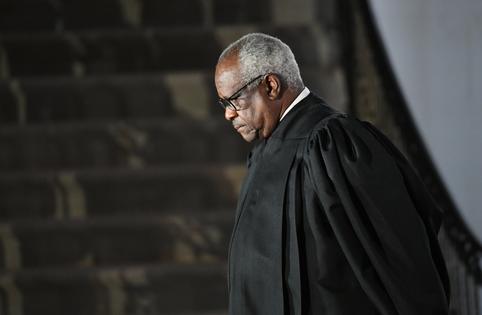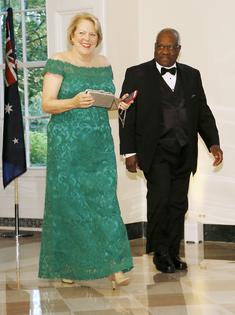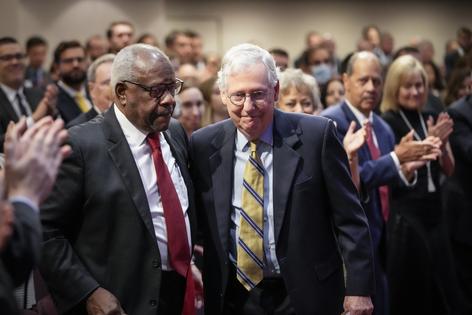Justice Clarence Thomas, whose activism -- along with his wife's -- has bolstered conservative causes, is poised to be a central figure as the Supreme Court reconsiders rolling back more landmark rulings
Published in Political News
With the opening of the U.S. Supreme Court’s new session on Oct. 3, 2022, Clarence Thomas is arguably the most powerful justice on the nation’s highest court.
In 1991, after Thomas became an associate justice and only the second African American to do so, his power was improbable to almost everyone except him and his wife, Virginia “Ginni” Thomas.
He received U.S. Senate confirmation despite lawyer Anita Hill’s explosive workplace sexual harassment allegations against him.
Today, Thomas rarely speaks during oral arguments, yet he communicates substantively through his prolific written opinions that reflect a complicated mix of self-help, racial pride and the original intent of America’s Founding Fathers.
He isn’t chief justice. John Roberts Jr. is.
But with Thomas’ nearly 31 years of service, he’s the longest-serving sitting justice and on track to have the lengthiest court tenure ever.
June Jordan, pioneering poet and cultural commentator, observed in 1991 when President George H.W. Bush nominated Thomas that people “focused upon who the candidate was rather than what he has done and will do.”
As a scholar of political theory and Black politics, I contend we haven’t learned from this vital insight.
Thomas’ service is under increasing scrutiny as his wife, a conservative activist, testified on Sept. 27, 2022, before the House committee investigating the Jan. 6 attack on the U.S. Capitol that she still believes false claims that the 2020 election was rigged against Donald Trump.
According to documents obtained by that committee, Ginni Thomas was instrumental in coordinating efforts to keep former President Donald Trump in office. Her efforts included sending emails to not only former White House Chief of Staff Mark Meadows but also state officials in Arizona and Wisconsin.
Of particular concern to the Jan. 6 committee is testimony from Thomas on her email correspondence with John Eastman, her husband’s former law clerk, who is considered to be the legal architect of Trump’s last-ditch bid to subvert the 2020 election.
In my view, Clarence and Ginni Thomas’ intertwined lives highlight a distressing underside to their personal union: the blurring of their professional and personal lives, which has had the appearance of fracturing the independence of the executive and judicial branches of government.
In this light, Thomas’ sole dissent in the case involving Trump’s turning over documents to the Jan. 6 committee is all the more alarming.
Clarence Thomas has cultivated a distinct judicial philosophy and vision of the world – and a view of his place in it.
From what can be gleaned from his own writings and speeches, his vision has been derived from Black nationalism, capitalism, conservatism, originalism and his own interpretations of the law.
Since Thomas’ confirmation, his ideas and rulings have attracted many critics.
But his interpetations of the law are now at the center of the high court’s jurisprudence.
In his concurring opinion of the court’s decision to overturn Roe v. Wade, Thomas argued that the court should reconsider reversing other related landmark rulings, including access to contraception in Griswold v. Connecticut, LGBTQ+ sexual behavior and sodomy laws in Lawrence v. Texas and same-sex marriage in Obergefell v. Hodges.
In short, Thomas’ sentiments reveal a broader ultraconservative agenda to roll back the social and political gains that marginalized communities have won since the 1960s.
The rulings in those cases, Thomas wrote, relied on the due process clause of the 14th Amendment and “were demonstrably erroneous decisions.”
“In future cases,” Thomas explained, “we should reconsider all of this Court’s substantive due process precedents, including Griswold, Lawrence, and Obergefell … we have a duty to ‘correct the error’ established in those precedents.”
Other recent Supreme Court rulings, on Second Amendment rights, Miranda rights, campaign finance regulations and tribal sovereignty, are also evidence of Thomas’ impact on the nation’s highest court.
In his memoir and public speeches, Thomas identifies as a self-made man.
Though he has benefited from affirmative action programs – and the color of his skin played a role in his Supreme Court nomination – Thomas has staunchly opposed such efforts to remedy past racial discrimination. Like other notable Black conservatives, Thomas argues that group-based preferences reward those who seek government largesse rather than individual initiative.
With the exception of guidance of Catholic Church institutions and his grandfather Myers Anderson, Thomas claims he earned his accomplishments by effort, hard work and his own initiative.
In a 1998 speech, Thomas foreshadowed his judicial independence and made clear that his attendance before the National Bar Association, the nation’s largest Black legal association, was not to defend his conservative views – or further anger his critics.
“But rather,” he explained, “to assert my right to think for myself, to refuse to have my ideas assigned to me as though I was an intellectual slave because I’m black.”
“I come to state that I’m a man, free to think for myself and do as I please,” Thomas went on. “I’ve come to assert that I am a judge and I will not be consigned the unquestioned opinions of others. But even more than that, I have come to say that, isn’t it time to move on?”
But like many of Thomas’ complexities, his own self-made narrative distorts the ideas of the first prominent Black Republican who remains one of his intellectual heroes – Frederick Douglass, the statesman, abolitionist and fugitive ex-slave whose portrait has hung on the wall of Thomas’ office.
But in “Self-Made Men,” a speech he first delivered in 1859. Douglass disagreed with the idea that accomplishments result from solely individual upliftment.
“Properly speaking,” Douglass wrote, “there are in the world no such men as self-made men. That term implies an individual independence of the past and present which can never exist.”
Thomas’ view of the law is rooted in the originalism doctrine of an immutable rather than living U.S. Constitution.
Since the 1776 Declaration of Independence, modern America for Thomas has been predominantly a republic, where laws are made for the people through their elected representatives. Unlike a pure democracy, where the people vote directly and the majority rules, the rights of the minority are protected in a republic.
Dating back to ancient Rome, the history of republicanism is a story of denouncing domination, rejecting slavery and championing freedom.
Yet in my view, American republicanism has an underside: its long-standing basis in inequality that never intended its core ideals to apply beyond a small few.
Thomas claims consistency with America’s original founding.
In my view, Thomas’ perilous conservative activism works against a fundamental principle of the U.S. Constitution – “to form a more perfect union.”
Thomas’ rulings reveal a broader ultraconservative agenda to roll back the social and political gains that marginalized communities have won since the 1960s.
This article is republished from The Conversation, an independent nonprofit news site dedicated to sharing ideas from academic experts. It was written by: Neil Roberts, University of Toronto. If you found it interesting, you could subscribe to our weekly newsletter.
Read more:
A seismic change has taken place at the Supreme Court – but it’s not clear if the shift is about principle or party
Supreme Court’s selective reading of US history ignored 19th-century women’s support for ‘voluntary motherhood’
Neil Roberts does not work for, consult, own shares in or receive funding from any company or organization that would benefit from this article, and has disclosed no relevant affiliations beyond their academic appointment.




























































Comments